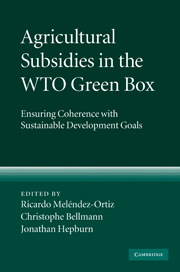Book contents
- Frontmatter
- Contents
- List of contributors
- Preface
- Acknowledgements
- List of abbreviations
- 1 Overview
- PART I The recent evolution of agricultural trade policy reform
- PART II The focus, extent and economic impact of green box subsidies
- PART III Green box subsidies and developing countries
- PART IV Green box subsidies and the environment
- 15 The environmental impact of green box subsidies: exploring the linkages
- 16 The environmental impact of EU green box subsidies
- 17 The environmental impact of US green box subsidies
- 18 Biofuels subsidies and the green box
- PART V Looking forward: how can change take place?
- Appendix: Text of Annex 2 of the WTO Agreement on Agriculture (“the green box”)
- Index
- References
18 - Biofuels subsidies and the green box
from PART IV - Green box subsidies and the environment
Published online by Cambridge University Press: 03 May 2010
- Frontmatter
- Contents
- List of contributors
- Preface
- Acknowledgements
- List of abbreviations
- 1 Overview
- PART I The recent evolution of agricultural trade policy reform
- PART II The focus, extent and economic impact of green box subsidies
- PART III Green box subsidies and developing countries
- PART IV Green box subsidies and the environment
- 15 The environmental impact of green box subsidies: exploring the linkages
- 16 The environmental impact of EU green box subsidies
- 17 The environmental impact of US green box subsidies
- 18 Biofuels subsidies and the green box
- PART V Looking forward: how can change take place?
- Appendix: Text of Annex 2 of the WTO Agreement on Agriculture (“the green box”)
- Index
- References
Summary
The dramatic rise in the production of biofuels, chiefly ethanol and bio-diesel, in the last few years has created a number of opportunities and an equal number of challenges for agriculture and the trade system. The prospect of being able to turn agricultural crops, and eventually agricultural waste products, into fuel is revitalizing many parts of the farming community. The lure of renewable fuels has considerable resonance across the political spectrum, from those concerned about the present reliance on fossil fuels and its global environmental consequences to those who see the strategic value of reduced dependence on imported oil. The reaction of a number of countries has been to encourage the development of renewable energy sources and to promote the use of biofuels. Developing countries see a possible new outlet for their agricultural raw materials, such as sugar and palm oil, which could benefit from a growing market and provide employment in processing activities. However, challenges are beginning to emerge, as the use of corn for ethanol appears to add to upward pressure on food prices and the total emissions of greenhouse gases associated with the production of ethanol may be as high as those from conventional fuels. If biofuels are to make a constructive contribution to sustainable development, it is clear that public policy needs to evolve on the basis of careful assessment of their contribution and appropriately targeted policies.
This chapter is intended as a contribution to the ongoing discussion on public policy and biofuels.
- Type
- Chapter
- Information
- Agricultural Subsidies in the WTO Green BoxEnsuring Coherence with Sustainable Development Goals, pp. 530 - 568Publisher: Cambridge University PressPrint publication year: 2009



